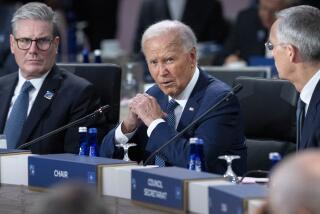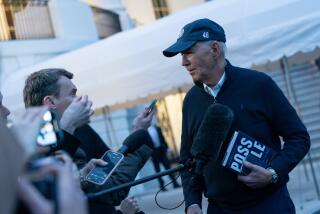PERSPECTIVE ON THE PRESIDENT : Was a ‘War Hormone’ at Work? : Bush’s hyperthyroidism combined with his usual hyper style may have shaped his choice of combat over sanctions.
- Share via
With the announcement that President Bush has been suffering from Graves’ disease--an overactive thyroid gland--the American public has a right to ask whether the disability could have affected his decision-making activities during the Gulf War.
The thyroid gland secretes a hormone that sets the body’s basic rate of metabolism and energy use. When it acts up, as George Bush’s did, the body simply speeds up. Bush lost 10 pounds in three weeks without dieting.
A respected textbook of medicine states that common symptoms of Graves’ disease include anxiety and increased nervousness and irritability, at times to the point of emotional instability. It also lists hyperkinesis--excessive motion.
What, if anything, was the effect of Graves’ disease on the President? Did a level of vague anxiety, a hyperkinetic “need to move,” play any role when he quickly bypassed Gen. Colin Powell’s recommendation favoring sanctions over war?
Stanford University’s Dr. Herbert Abrams is an expert on the potential impact of medical illness on cognitive functions and decision-making processes of presidents, such as Franklin D. Roosevelt’s heart failure during the Yalta conference that shaped postwar Europe.
“The potential impact of the hyperthyroid state on the decision-making process of George Bush is certainly worth considering,” Abrams says. “All of the evidence suggests that the decision for a military resolution to the Gulf conflict was a hasty decision--in spite of advice from six of eight former secretaries of state, three chairmen of the Joint Chiefs of Staff, and so on. A number of factors were involved in this decision, and the hyperthyroidism may have been a significant one.”
Before his thyroid disease was discovered, Bush was a 66-year-old busy executive whose personal physician had asked him to slow down. “Every time we try to give him a break, he tries to add things to his schedule,” the physician told the press. Was this simply Bush’s way? Or was this the emotional speedup of hyperthyroidism added to a previous habit of hyperactivity--leading to unreasonable decisions?
While doctors at Bethesda Naval Hospital were reviewing the President’s thyroid tests to decide on a course of action, Bush wandered down the hall to visit patients who had been wounded in the Gulf War. Patriotism? Hyperthyroid restlessness? Or the interaction of the two? Or just a chance to stretch his legs?
Alexander George, known for his studies on Woodrow Wilson’s emotional collapse and subsequent stroke during his presidency, thinks that questions should be asked about the relationship between Bush’s thyroid disease and his recent policy-making style. “It’s a plausible hypothesis,” he says. “There are indications that (Bush) seemed to be more impulsive--he’d blurt out statements. But reliably relating that to his thyroid illness would be difficult.”
One way to examine this question would be to review videotapes of Bush over the past year, looking for any acceleration in his rate of speech brought on by increased levels of thyroid hormone. Or some fidget index could be devised to define and measure Bush’s symptoms of restlessness. Abrams suggests that “a good clinical-medical-psychiatric study of Bush before and after his thyroid condition is treated” would be helpful in reaching meaningful conclusions. “It’s certainly something worth bringing to public attention,” says Abrams. “The cognitive impact of diseases has not been adequately addressed in terms of presidential decision-making.”
More to Read
Get the L.A. Times Politics newsletter
Deeply reported insights into legislation, politics and policy from Sacramento, Washington and beyond. In your inbox twice per week.
You may occasionally receive promotional content from the Los Angeles Times.










